Next Article
13 Ways of Looking at Success
Redefining what success means to different players
This split, subs from academy teams have been used more than ever. Here are the stories of these journeymen in search of their standing as a professional player.
01. PEAK PERFORMANCE Picture a mountain. Maybe K2, one of the most technically difficult to climb in the world, requiring you to navigate around ice pillars and glacier faces. Or Annapurna, or the Murder Wall, or that one part of Siula Grande which is just a vertical ascent. Or maybe something easier, something just run-of-the-mill, like Mt. Everest. After a certain point, all mountains are the same. They are hard. They are punishing. People die trying to climb them. And sometimes, they succeed.
Pro play is a mountain too. Whether or not you realize it, every pro gamer you know, and especially the ones you don’t, are also climbing. Sometimes you are Fnatic, the first expedition to scale the peak and live to tell the tale. Sometimes you are Faker, and you have climbed all the routes, you have conquered the mountain, and it is your own record you are trying to break.
And sometimes, you are a team’s 11th-hour sub, the academy team player called up to the big leagues, or the longtime pro who has played for years and never made it past playoffs. Sometimes you are just climbing. You are one of hundreds of climbers, indistinguishable. You won’t set the fastest time. You won’t be the first. You might even fail. But you want to have made that climb all the same. You want to stand at that summit, look back at that route you took, and know you did it too.
02. GLHF The one and only time Team Liquid Academy support Joey “Joey” Haslemann has played on the LCS stage, he was the emergency sub for Counter Logic Gaming, playing support to Aphromoo, of all people. With 12 hours’ notice, he was so caught off-guard he was writing an essay for one of his college classes on his phone as he flew to Los Angeles. It was the 2017 Spring Split, and CLG was playing against Immortals. Olleh was the support on the other side.
The next time Joey donned the jersey of an LCS team, it was for TL at MSI. He was their designated sub and already in Berlin. I imagine this time, he still only got 12 hours notice that he would be playing after all. This time, the player he was subbing in for was Olleh.
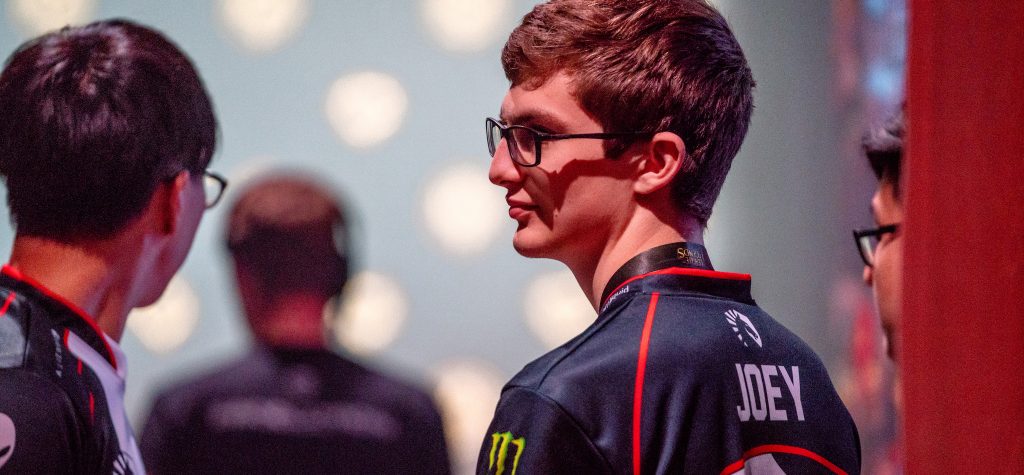
There are the famous debut games, like Faker in 2013, dueling Ambition’s Kha’Zix with Nidalee. But those are the rare ones, the ones that mark a new star. Most pro debuts are unmemorable, or even memorable in a bad way. Joey’s debuts have been unexpected, even for himself. “There’s always that thought in the back of your mind, that there’s a chance I would play,” Joey says. “But I thought if it ever happened it’d be in the regular split, as an experience thing. I didn’t really think I was going to play at MSI.” Joey’s teams—first CLG and then TL—have gotten smashed both times. But for Joey, even these harrowing experiences have been good. Before all this, he was just a depressed college student. “It sounds weird to say, but I felt like I wasn’t being challenged at all. So when I saw the opportunity to go pro, it looked like a really good time for me to focus on something I love doing and try to make it work.”
“I’m so fucking happy now,” he says, then, laughing, tries to channel his exuberance more politely. “I think about it every day, how lucky I am to be able to play on such a great org like Team Liquid and to be excited to go to work everyday.”
Put that way, suddenly subbing in for Olleh on the international stage is a blessing. Joey’s certainly being challenged now. And it’s given him new goals. “I thought about it for the first time this morning, like, wow I represented my entire country at an international event a month ago!” He adds, “I did really bad. Now I want to do not-so-bad. I’d like to be a successful international player for North America.”
03. BACK TO SCHOOL “As an academy player,” says OpTic Gaming Academy support Austin “Gate” Yu, “I think I speak for all academy players when I say, no one is trying to stay in academy. Everyone is trying to move up.”
Gate is no stranger to making the best of a bad situation. A true utility when he debuted, he swapped lanes more times in his first two years than most people their whole careers; despite starting as a mid lane main, he switched to support when he joined LCS, then dabbled again in mid lane, and even played top lane for a single game as Gangplank—which he won.
“It was rough,” Gate says as he reminisces about his time on Team Impulse. “We pretty much had to do everything ourselves. We didn’t have any support staff. We didn’t have any people to even help us with the day-to-day. The most we had was a guy with a car! Sometimes he drove around and got food for us.”
That first year in LCS taught Gate a lot—at least outside of the game. He thought joining an LCS team was a chance to go YOLO, drop out of college, and play games for living. Instead, he was learning how to pay utilities and even fix things around the team house.
But more than that, he had to learn leadership skills. He and the rest of TIP were young, living on their own, and still desperate to make it. “And we had two imports who at first couldn’t speak English well at all,” he adds. “We all wanted to succeed and a lot of times it came to people stepping up and telling each other what to do. My first year of playing pro in LCS was the most I’ve ever learned.”
Gate spent the 2018 spring split playing in Korea, where he got to visit with his ex-TIP teammates, Pirean (now on SKT) and Rush (now on KT Rolster). When he came back for LCS tryouts, a number of teams gave him the same feedback: start managing the game. Start directing people and telling them exactly where to go, exactly what to do, exactly how to play. It’s stressful, but it’s something Gate thinks he needs to develop. “A lot of people are looking for that, at least in the support role.”
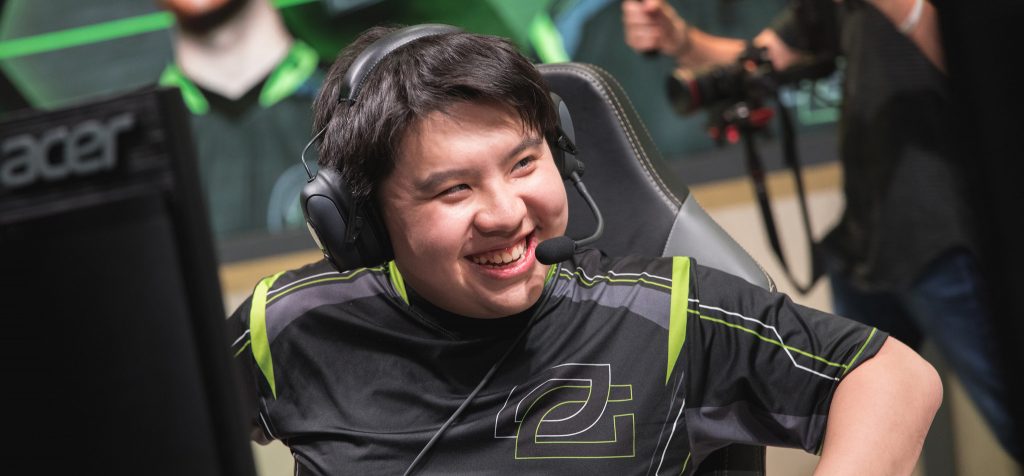
These days, Gate says, LCS has made a lot of progress developing the infrastructure to support its players. Team organizations are now more than one man with a car who sometimes buys food. But Gate still has to step up and be a leader, this time by telling his academy teammates what to do, in game at least. On OPTA, for the first time, Gate is the veteran, and his teammates trust him. “They want me to lead them. I thought at first I shouldn’t be a leader because I would make mistakes. But now I feel like it’s fine, even if I make mistakes. It’s more valuable that I’m making those mistakes now. It’ll be better for everyone in the long run.”
Just like lose is improve, academy can be opportunity. Not settling can mean more than striving to make it back to LCS. For Gate, it means taking the time to develop as a player, and, more importantly, as a team leader. For the rest of us, it can be a reminder that learning is never over. We can always learn to be more.
04. GREAT (AND SMALL) EXPECTATIONS
“Success for me means winning NA LCS finals. That’s my goal right now.” — Goldenglue, Cloud9 Academy.
“Even just going to playoffs once would be a really good start for this organization. Just taking it step by step will change the outlook and view people have on me. … There are only so many chances a player gets in their career and hopefully I can make the chances worth it before my luck runs out.” — Lourlo, Golden Guardians.
“It’s really hard to quantify what my goals are. I could just be really broad and say, ‘I want to be a top support player. I want to be a leader.’ I want to be all these things. I guess the easiest quantifier I could say is, I want to be a positive voice and directly impact the success of my team.” — Matt, Golden Guardians.
“I want to be known as a better player. I don’t [want to be remembered] as a translator. That’s basically [everyone’s] impression of me.” — Kwon, FlyQuest Academy.
“When I first started, I was like, ‘I’m just going to try to get better. I’m going to look up to [whomever] is the best team at the time.’ So I wanted to go to TSM because they were the best team. It’s kind of like going to Barcelona for soccer. That was my goal. To play for the best team. To be on the list.” — Altec, (formerly) Echo Fox.
05. UNDER PRESSURE “How are you doing?” It’s an easy question that’s asked countless times every day, and countless times we answer glibly, “I’m good.” We never want to burden strangers, friends, or our family with real feelings, to admit that the answer might be, I don’t know. Those early days of gold star stickers and GPAs are gone. As we grow up, we’re cast out into the sea of self-doubt with no easy answers. Am I learning as quickly as I should be? Have I improved? What can I do better? Or, the worst feeling of them all, am I hopeless?
For pro players like Cloud9 Academy’s AD carry Yuri “Keith” Jew and midlaner Greyson “Goldenglue” Gilmer, the temptation is to look to the community for feedback. “I didn’t expect to sub in for Sneaky, so a little bit of me didn’t feel like I belonged or that I should have played in those games,” Keith says about the first few weeks of the summer split, when he was playing on C9’s starting roster. “I definitely thought about whether Sneaky’s fanbase would care or how his fans would react to me playing for him.”
That LCS fanbase can be merciless, and turning to them for a job evaluation can be an exercise in self-excoriation. I remember vividly an interview Keith had with Travis Gafford last year. Despite coming off a win against Team EnVyUs, Keith, clearly holding back tears, admits that his confidence is a problem for him. “There was a lot of pressure on me this split because of our new roster. A lot of it got to my head along with the community flame. I dug myself a hole, and the hole kept getting bigger and bigger, to the point where it was so hard to climb out.”
But if Keith has learned anything, it’s how to deal with negative feedback. He says he’s a much different player now, and this time, the pressure of subbing in for Sneaky and the community’s opinion of his play hasn’t diminished his confidence. “I do think I can be the best in NA LCS,” he says. “I’m not a pro just so I can aspire to be middle of the pack. Every AD carry should have the confidence in themselves to think they could be the best. Otherwise, I don’t know why they would want to be a pro.”
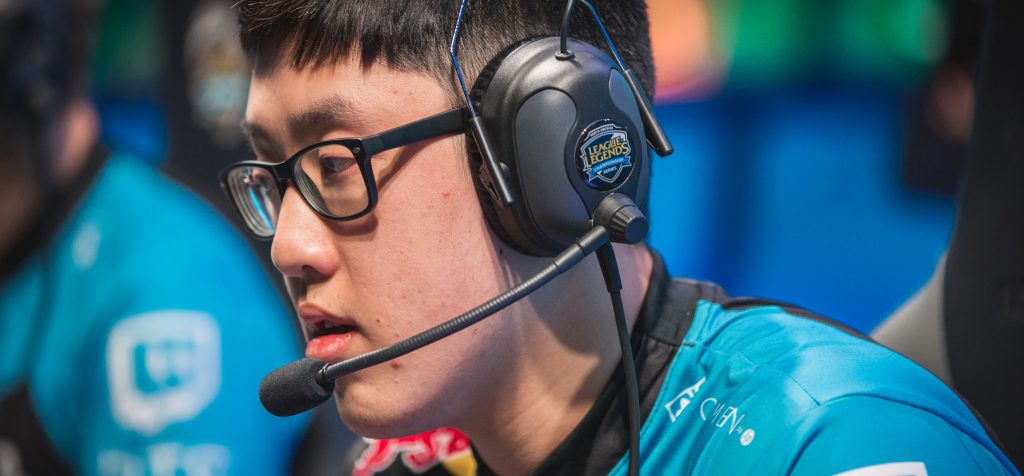
His teammate Goldenglue is also all-too-familiar with the crush of community opinion. Year after year, he’s had to deal with the memes, forever the scrim god who chokes on stage. He rattles off the questions that sometimes plague him when he’s playing: “‘What would my team think about me if I make a mistake? What would my coach think? What would the community think?’ There’s a lot of consequences to playing bad, but you can’t think about that in the moment.”
Like Keith, Goldenglue has learned to shut out the noise and turn inward. These days, he says, “I’ve stopped apologizing endlessly and just let my actions speak for me.” It’s a hard lesson to truly internalize: how to be kind to yourself, how not to let your self-image be defined by your mistakes, how to separate your self-worth from how others value you. Goldenglue has had to learn it the hard way, under pressure on all sides. “When your whole life is completely dependent on performing as a player, you feel really empty. You [have to] realize there’s so many people that care about you and you still have value outside of just being a performer and playing onstage. There’s more to life than just playing League of Legends.”
We love to tell the players, leave it all out there. But put enough of yourself into the game or your career or anything else, and you’ll realize you need something to fall back on. Keith’s 1-17 record on Echo Fox will never show how much Yuri Jew has grown, or the drive he still feels to be number one. Goldenglue’s KDA will never reflect all the soul-searching and stress and punishing spotlights Greyson Gilmer has endured, only to emerge a stronger, more confident person and player.
And what about you? Who are you, after the game is over?
How are you doing?
06. THE GRIND In the world of gaming, the “grind” has mythical status. It is almost its own lore, a neutral monster that everyone encounters. When the season begins, it is time to “grind.” You must “grind” until you reach the tier that best reflects your ability. Didn’t hit the tier you expected? Perhaps you could have “grinded” (never ground!) more. When it becomes too much for you, you are “quitting the grind.” When the game inevitably lures you back, you are “back on your grind.”
The grind is a social contract the player makes with the game. It creates what seems like a simple meritocracy: more practice makes more better. And at first, it’s true. The more time you invest into the game, the better you get. No pro made it to where they are now without the grind, and the ones you remember are the ones with work ethic. “No matter how many championships they’ve won, they don’t take days off,” TSM Academy’s MrRallez says. “They keep grinding Solo Queue or talking to their teammates or coaching staff about how they can improve.” The grind never ends, not even for pros.
In 2013, Lolesports put out a video almost self-consciously called “The Grind,” where then-pros of NA LCS talked about all the work that goes into playing video games for a job. “We have to eat, sleep, and breathe this game,” NintendudeX, then the jungler for Good Game University, says. In 2018, that hasn’t changed. When Doublelift switched to streaming in the spring split of 2017, he cited the practice schedule in an interview with Travis Gafford, then of Yahoo Esports: “Ten to twelve hours a day for ten months, eleven months in a row.”
But the truth is, the grind is a double-edged sword. The game breaks its side of the contract all the time. In that 2013 video, SaintVicious notes, “Even the last-place teams, they all sacrifice. They put just as much hard time in as everybody else.” Anime and sports biographies and interviews with the winning team lie to us by omission. “Everybody worked hard,” someone will say after a win.
“We all practiced really hard.” But think about that hypothetical interview with the losing team. Wouldn’t they say the same?
“Everybody worked hard,” they might also say. “We all practiced really hard.” And still, we lost.
Leave it to CloudTemplar, the former CJ Entus jungler turned OGN caster, to put it best when he said, “Hard work does betray you. Why wouldn’t it?”
07. ENVY US Talking to Golden Guardians Academy AD carry Benjamin “Benji” deMunck, formerly LOD, feels strangely like talking to a survivor. Not a single team Benji has started for is still around in NA LCS. For a terrifying moment in the spring split of 2018, it felt like Benji would go the same way, quietly into the dark of a wiki page, a victim of wrist problems, roster changes, and franchising.
It’s painful to go back and watch interviews with Benji from the start of 2017, knowing that he had thought that Team Dignitas was his big chance and knowing that the year would end with him not on any team and rehabilitating. In one from February 2017, Blitz asks him what his favorite part of the challenger series was. He hems and haws, then says, “I don’t know if there’s anything to be happy about in challenger. There’s no redeeming factor… It was a dark time for me.” An off-camera voice prompts him: but you got out of it. “Yeah,” he says, “I’m seeing the light of day in LCS.”
Here is where, in the movie, you’d smash cut to Benji now, on Golden Guardians Academy.
It’s hard not to feel bad for Benji. With DIG, he thought he had finally worked hard enough to earn his place on a top team, but just as he was given the chance to prove himself, his body started failing him. Wrist problems that had plagued him since his time on Team EnVyUs rapidly got worse, and though he understood and respected DIG’s position to go with another player for most of the 2017 summer split, he couldn’t help feeling hurt and depressed. “Getting replaced was the most difficult thing that has happened to me,” Benji says. “Looking back, I think I may have made a little bit of a mistake to join Dignitas. For my career, it probably would have been a better choice to stay on NV and keep playing with Hakuho… But it was my own doing. It’s not worth complaining about.”
When we talk to winners, it’s easy to believe that suffering is just the road to success, that because you suffer and work hard, you deserve success. But even if all winners in LCS have worked hard, not all hard workers in LCS are winners. Benji has practiced and grinded and played through wrist pain so bad he’d shake his hand out in between minion waves, but that hasn’t guaranteed him a place on a winning LCS team.
“Playing in academy, and beyond that, being in tenth place, especially while seeing my peers and ex-teammates doing really well in LCS, is really difficult to swallow sometimes,” Benji admits. The 2018 NA LCS spring playoffs was littered with Benji’s ex-teammates: Ssumday on 100, Solo and Hakuho on CG, Altec and Adrian on FOX.
Without a doubt, Benji would have liked to be one of them, but that doesn’t mean he’s unhappy. After all, he’s still in the game, still playing professional League of Legends, and it’s still just as meaningful to him. “When I got replaced, I completely changed my lifestyle and my attitude,” he says. “I worked really hard on myself and did some self-reflection, and was lucky enough to get an offer to play with Golden Guardians Academy. Whatever I can do from here on, I’ll be really happy with it.”
2018 wasn’t the future DIG LOD would have wanted, but GGA Benji has been on his own journey of survival: surviving his body, surviving being replaced on DIG, surviving the depression that hit him in 2017. You don’t win titles for surviving, but it’s no small feat either, to keep working hard and improving yourself despite everything. Hopefully, playing AD carry for GGA won’t be another dark time in Benji’s life, but part of his path forward towards his goal of being recognized for the player he knows he is. Maybe next year, he’ll be sitting in front of another interviewer, another person like me who wants to know, what was the best part of playing in academy?
08. HONOR SYSTEM League of Legends is a team game. No matter how flashy your own play is, you win as five and you lose as five. When OPT support Terry “Big” Chuong looks back on his time on EFX in 2016, he takes their 1-17 record as a piece of the puzzle that makes up who he is. “We failed as a team, and I was part of that team.” The failure was so devastating that Big was convinced he wouldn’t be able to get back on an LCS team. “I didn’t expect myself to pull through.”
Now on OPT, it’s also the team that keeps Big going. For him, the best thing is seeing how his team matures and works better every single day. “It’s the best feeling,” he says. “We don’t necessarily need to win, but if we’re struggling a lot the week before with a lot of stuff, and this week we don’t struggle as much but still lose the game, it feels worse but I still feel proud that we can come this far.”
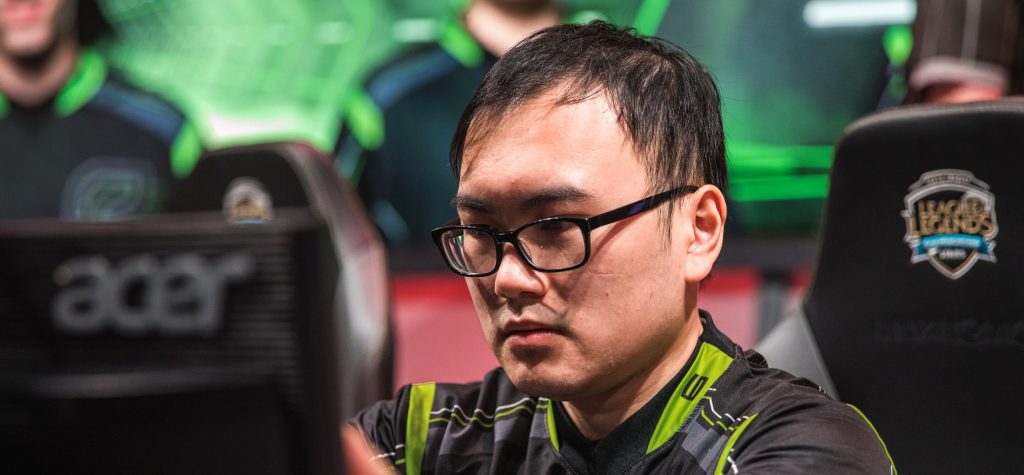
Week 5 of the summer split was the first time in OPT’s history that the team went 2-0. Though it only resulted in a tie for eighth at the time, you can sense the team’s elation when they smashed Cloud9 in the second game of the week. Big might not have had the flashiest plays on Tahm Kench, but at 0/2/10 he did exactly what he should have, with no mistakes. It was an improvement from the losses of Week 4, which Big took to heart. “When we lost against Clutch Gaming, I made the call not to back. It was the wrong call.”
Like always, the stream drops a highlight of the winning team’s comms after the game. Against C9, OPT sounds frantic, even a little hyper. At one point jungler Akaadian chides his teammates, “Okay, calm down boys, calm down.” But at around 32 minutes, C9 engages onto OPT, only for Arrow to get a triple-kill, finishing the ace. You can hear Big shouting during the team fight, “You guys can end, you guys can win off this!” as Arrow shuts down Sneaky. Arrow screams something incomprehensible, maybe unfit for broadcast, before crooning, “Oh, baby!” Even though he’s gray-screened, Big grins as he watches his team win. This time, the call is right.
09. BALANCING THE GAME When you’re my age, the bloom of being an adult has worn off. We’re past the first paychecks, the first bonuses, the thrill—however dubious—of contributing to your first 401(k). Instead, these days, the questions we ask each other are downright gloomy and pessimistic: Are you happy? Does your job fulfill you? Do you hate going to work as much as I do? Are all jobs like this? Did I do this all wrong?
If I were to evaluate the job, being a professional League of Legends player is a true bad end. The hours are terrible, there’s no work-life balance, no path for advancement, no real job development opportunities. Until quite recently, the pay was a crapshoot, unless you were one of the best. And don’t get me started on job security. And yet, no pro seems to regret their decision.
“One of the happiest things that I can say about my life is I’ve been very fortunate,” GGS support Matt “Matt” Elento says. He’s never won a title, and as the meme goes, the highest he’s placed so far is fourth place with Team Liquid. Few people can say they’ve lived through a workplace personnel dispute so bad that there is a seminal documentary made about it. But if you ask him whether he regrets his career, he’d tell you very firmly: definitely not. He says, “Just imagining if I never downloaded League of Legends, imagining if I was never picked up by my team, all these thoughts seem so random and seem so impossible to happen. But they just happened. I’m very fortunate.”
I’ve come to think of adulthood as a series of compromises, a contest not of how much I can gain but of how much I can minimize my losses. And yeah, sure, I’m not the kind of person who’d go pro anyway. I’m risk-averse, terrified of failure, and more importantly, way too old. When I look at the landscape of NA LCS pros, it’s not the players who have won multiple titles who inspire me. Of course they would come back. It’s people like FlyQuest Academy support Kevin “Kwon” Kwon, who gave up a business degree at Rutgers to go pro, who’s weathered being relegated as Team Coast with a 1-17 record, who’s been a substitute and a translator and is still determined to make it in NA LCS.
Unlike Matt, Kwon is slower to answer whether it’s been worth it for him, repeating the question first and letting it sit between us for a beat while he thinks. “I wish I was more successful, to be honest,” he says eventually. “But,” he says, and pauses, just enough for the sounds of the FLY team behind him to come through, a sudden cheerful burst of laughter, “I wouldn’t regret what I’ve had. Yeah, I don’t regret it.”
10. ADRENALINE RUSH When I interview 100 Thieves Academy toplaner Brandon “Brandini” Chen at Rift Rivals, we are in a shadow. Literally, because we are in a small room backstage with automatic lights that have gotten bored waiting for us and turned themselves off. But also figuratively, because that’s been the story of Brandini these last two years: a substitute player for two of the most well-known top laners in the world, Looper and Ssumday.
Any other person might chafe under the long shadows these giants cast, but Brandini treats it more like a learning opportunity. “I like learning from the top laners I used to idolize,” he says. For him, being in the Echo Fox organization with Looper in 2017 was a chance to learn from a player he’d always watched from afar. “I learned so much from Looper that learning from others like Hauntzer and Ssumday feels like I’m just re-learning fundamentals Looper already taught me but I’ve forgotten as I keep moving on.”
Though Brandini stepped in as EFX’s top laner in Week 7 of the 2017 summer split, Rift Rivals is Brandini’s first stab at the international stage. That in and of itself is hard enough, but a converging of many disparate factors—Ssumday being “benched,” Meteos being traded, playing alongside the highly anticipated LCS debut of Levi, and a rough matchup against G2—all make the first day of Rift Rivals unusually cruel. It’s clearly on Brandini’s mind, but he takes it in stride with a mental shrug. Looper sets a lofty bar for Brandini, one he uses to measure the performance of other top laners, as well as himself. But beyond just teaching Brandini about when to teleport and how to pressure lane, Looper is also a good example of what it’s like to fail. After all, even world champions can struggle with showing their full potential, as Looper did on EFX towards the end. Brandini saw Looper struggle. And now, at Rift Rivals, it’s his turn.
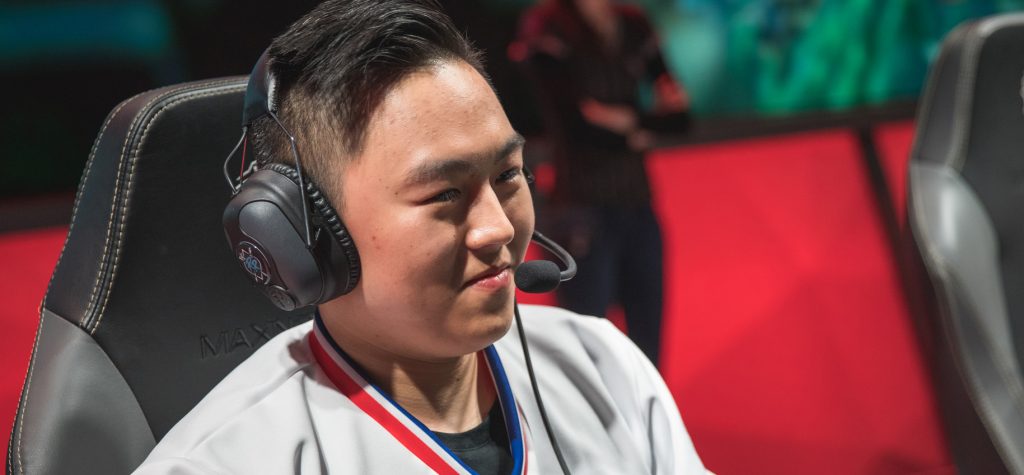
I ask Brandini to imagine the position reversed. What if he were the veteran player, and I was interviewing the newbie? What would he want that newbie to say about Brandini?
Brandini pauses. “I just want them to remember how hard their journey was and that they had someone there to teach them.”
Surely every player hopes for the fairytale beginning, of debuting onstage and being hailed as the next big thing. On the second day of Rift Rivals, Brandini gets a little taste of that Cinderella moment. Up against Splyce, 100 put Brandini on Dr. Mundo. This time, instead of constantly dying, he is immortal, leading SPY on a merry chase through their own base, buying time for his team to break the base by eating tower shots and enemy attacks like popcorn and still managing to come out alive. As 100 chips down the second nexus tower, the audience chants his name, though Brandini hardly seems to hear it. Levi and Ryu are all smiles as they get out of their chairs, but Brandini’s face is still serious as he takes off his headset, takes a drink of water, and gets up to shake hands.
You can watch this next moment on the VOD, if you like. The cameras capture it in its full glory. 100 descends from the stage and goes to high-five the audience. Brandini is at the very end of the line, and at first he still has that look on his face, a cross between concentration and nervousness. Then someone in the audience hoots his name, a low “Brandini!” A beat later, two or three voices join. He looks up, as if hearing it for the first time. His face, young and unlined, is luminous in the light of the studio. No shadow crosses it now.
Finally, he cracks a smile.
11. LEGENDS NEVER DIE The sports fan is a creature of numbers and measures. In a world of increasing optimization, the sports fan can say they did it first. Like a truffle pig nosing in the underbrush, they search tirelessly for more and more obscure ways to prove their positions: APM, DIPS, SALAD. The idea of “Moneyball” has been thrown around so much it’s less of an analytical concept and more of a prayer: grant me the numbers to prove my team is performing, the courage to accept when the numbers say they are not, and the stats to know the difference.
But stats is the outside looking in. It is the way the fan, the coach, the scout, the desk analyst, and the writer make sense of what they are seeing. Ask a pro player, and they won’t rattle off a KDA or kill participation when they’re talking about success.
For some pros, measuring success is an easy binary: are you winning? “Success means winning the NA LCS finals or going to Worlds,” Goldenglue says. “If you can do that, then you’ve had a successful career, in my opinion.”
Getting to Worlds has always been Johnny “Altec” Ru’s benchmark for success too. “I think we [as EFX] have a really good chance of doing it,” he tells me when I interview him after the first day of Rift Rivals. “I’ve sacrificed a lot to get to this point—friends and family and stuff like that. So if I don’t make it to Worlds this year, I’m going to be pretty disappointed.”
Altec points to Pobelter, who’d come onto the LCS scene at around the same time as him, as an example of where he thinks he should be by now. “We were these two young kids that had so much potential, and people looked at us like we’d both be superstars. For Eugene, he ended up winning two titles. And for me, I didn’t win anything, so I feel pretty bad. I’m pretty happy, but it sucks not to win anything.”
Sitting with him backstage that Thursday afternoon in July, I had taken it for granted that this year, as the AD carry of North America’s second-best team, Altec was a shoo-in for worlds. I thought for sure he’d finally reach this goal he had set for himself as far back as 2015, when he’d given the same answer to Azubu in a video interview. But LCS is a fickle mistress. Five teams, three years, and a roster change later, Altec is no longer with EFX and no closer to Worlds. He’s back to being on the outside, looking in on the top teams in LCS as they inch ever closer to that lofty goal he’s been running towards.
Binaries can set you up for failure and frustration just as much as success and satisfaction. Maybe that’s why other pros prefer looking at success in shades of gray. “Not to get too philosophical,” Matt says, “but I feel success really just means being happy with your day-to-day lifestyle and accomplishments. I’m not on a winning team right now. I’m not first place. I haven’t taken any titles. But I don’t think there are requirements like winning first place or winning a title to be successful. I think the standards I set for myself defines success for me.”
For GGS toplaner Samson “Lourlo” Jackson, success is defined over a long period of time, determined not by mere wins or losses, but by his legacy. He wants to be a person that others will look up to, who’s accomplished things that people will remember. He’s from a small town in Illinois, and he hopes to one day put it on the map. “My goal in the end is to have enough success so people can think, ‘Wow, I wish I grew up in that town!'”
I’ll spare you the effort of looking up notable residents from his hometown of Antioch, Illinois. They include an investment banker who was the subject of an episode of “Unsolved Mysteries,” an NCAA champion who never got to play for the NBA because of a point-shaving scandal, and a contestant on the eighth season of “The Biggest Loser.” For me, at the very least, Lourlo is the most memorable, the only one whose name I’ll remember.
So maybe, at least to this one person, he’s already succeeded.
12. 50/50 Failure and success are two sides of a coin, but it’s better to think of a coin mid-flip or a coin you hold in your hand, palm covered, so you can’t see which face is up. In 2015, the coin came up heads for FLY jungler Lucas “Santorin” Larsen: he was rookie of the split, on a team that won an international event. Then, just a year later, the coin came up tails: temporary retirement, two teams with management issues, even a stint in challenger.
In 2018, the coin is once again in the air, catching light on both sides as it spins. Santorin is back in NA LCS, on a team that finished eighth in spring split and now looks like a playoffs contender.
If you asked the community, they’d probably tell you that Santorin peaked in 2015. Certainly he hasn’t achieved the same accolades and name recognition since. But ask Santorin, and he’d tell you he views his time on TSM more critically. “I wasn’t that great of a player then,” he says. “I didn’t have much experience. I was good mechanically, but when it came to things like how to play with the team, I wasn’t really good. I feel like I was kind of holding them back. I wasn’t contributing as much as I should have. Which, looking back, always makes me pretty annoyed.”
After all these years, success is still something Santorin is striving for. No matter how celebrated he might have been in 2015, he still doesn’t feel like he’s achieved that goal of being the best. “You can’t show you’re the best by [having] one good year,” he says. “You have to do well several years.”
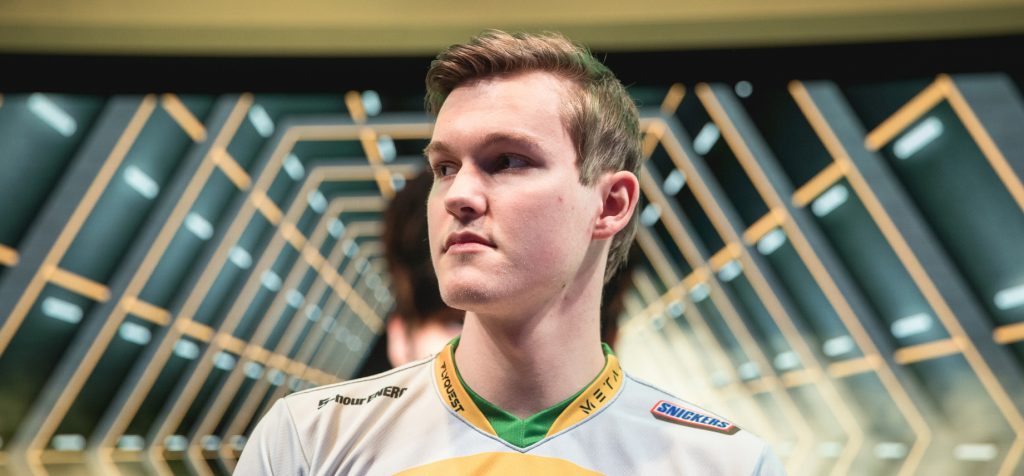
Santorin has a competitive personality, one that’s tirelessly chasing after the elusive title of “the best.” It’s his motivation. You could even say that he was named for it. While his in-game handle is just a meaningless word made up by a friend, Santorin’s full name, Lucas Tao Kilmer Larsen, is anything but. As he’d tell you, Lucas comes from Latin, meaning “shining” or “illumination,” and Tao comes from Chinese, meaning “the way.” Together, his parents chose a name for him that means “the shining path.”
“I’m really happy and grateful for it,” he says. “It’s something, like, if I’m feeling a little down or something, I think about it, and it makes me a little happy.”
13. MOUNTAINS BEYOND MOUNTAINS Ask me about Goldenglue, and my first thought isn’t of scrim gods or chokers or whether C9 should have played him instead of Jensen, but of a little moment tucked into the second episode of TL’s behind-the-scenes show, “Squad.” About two-thirds of the way into the episode, Goldenglue recounts a hike he took with his girlfriend. “We were walking down a hill. It was really sandy, and I slipped. So I had two choices: either run all the way down and use that forward momentum to keep going or just fall on my ass and then have the chance of rolling off the mountain and dying. So I ran all the way down it. My girlfriend was watching me in complete horror that I was about to die.” He pauses, then turns away from the camera, smiling to himself. “It looked pretty cool afterwards.”
In the 2017 spring split, in an attempt to improve their performance, the team role-swapped Piglet from AD carry to mid lane, effectively subbing Goldenglue out. (This episode, incidentally, is entitled “Midlet” and is all about that roster swap.) Twice in 2017, TL made a run all the way to the bottom, all the way to the relegation matches.
A year later, it is 2018, and TL has climbed all the way back up, the spring split champions. That clip of Goldenglue still feels ominous, or maybe just portentous, imbued with a predictive power he couldn’t possibly have had or wanted. In 2018, Goldenglue is on C9, on another infamous roster with another role swap, this time with Jensen occasionally in academy and occasionally in the botlane. When Goldenglue had started for C9, the team was doing the worst they’d ever done historically. A few weeks later, just like TL, C9 is making a slow climb back up the standings—and just like TL, without him. Despite all his soul-searching, despite all his confidence-building, is Goldenglue doomed to live this over and over again?
I don’t have any answers, for Goldenglue, for C9, for anybody. But I wonder if Goldenglue sometimes thinks about that hill he had to run down, to keep from falling off the mountain. That moment when his choice was to fall off and die, or to run down so that he could keep climbing up.
Picture a mountain, and all the pros on it. They are all trying to make their way to the peak, whatever peak that may be. Some of them are taking well-known routes: the Doublelift, the Rekkles, the Faker. Others are trying to find their own way, carving out the Brandini, the Big, the Lourlo. Maybe some of them will lose a grip, slip a little, have to run down one face just to be able to keep going up another. And maybe still others will have to turn back entirely.
But still, they were there. And still, they keep climbing.
And maybe at the end, they’ll look pretty cool.
